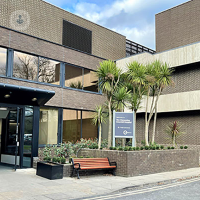What is colposcopy?
Colposcopy is a procedure which allows the cervix (the neck of the womb) to be examined, using a device called a colposcope, which illuminates and magnifies the area.

Why is colposcopy performed?
Colposcopy is most commonly performed after a cervical smear which has shown some presence of abnormal cells. A cervical smear is a routine procedure offered to women between 25 and 65 years of age, during which a cell sample is taken from the cervix, and is later examined in order to detect any changes in the cervix and if any abnormal cells are present.
Colposcopy may also be performed if smear results are consistently inadequate, or for other reasons such as bleeding between periods (inter-menstrual), bleeding experienced after sexual intercourse, or an abnormal or unusual appearance of the cervix.
What do abnormal results mean?
If the investigation is for abnormal cells, they are generally regarded as being pre-cancerous, which means if they are left untreated, they could become cancerous in the future.
However, if the abnormal cells are found at this early stage, the chances of cancer developing are very small. The cells may develop, but usually over a number of years, meaning they can be treated quickly and easily. It is important for women to be reassured that there is very little need to worry, and in 90 per cent of cases, the pre-cancerous condition is eliminated.
What does colposcopy involve?
The procedure is actually similar to the smear test procedure, but takes longer, as the colposcopy looks for any abnormalities through the application of various solutions to the cervix. Colposcopes can also be used to examine the vagina and vulva.
A colposcopist inserts a speculum into the vagina, which dilates it and allows for examination both in the vagina and cervix.
Usually when the colposcopy is performed because of abnormal smear results, the colposcopist will apply a small amount of acetic acid (vinegar) to the cervix with cotton wool. This solution allows the specialist to see any changes in the epithelium (the skin covering the cervix) more clearly.
On some occasions, the colposcopist may wish to take a biopsy, which is a small sample of tissue, from the cervix (usually the size of a grape pip). When the biopsy is taken, it may cause a small amount of bleeding, but this can be controlled by applying silver nitrate to the affected area. Once the bleeding has stopped, the examination is over. The biopsy is then sent to be tested and analysed by the pathologist.
How does it feel during the test?
Both the application of vinegar and the application of the silver nitrate solution may cause stinging and a certain amount of discomfort. However, the procedure only takes about 15 minutes, so it is not long.
How to prepare for colposcopy
- Avoid having sexual intercourse the day before the colposcopy
- Do not put anything into your vagina (e.g tampons or medicines) in the 24 hours leading up to the test
- Schedule the test for when you are not due to come on your period
- Some women prefer to wear a panty-liner as they may experience slight bleeding or discharge after the colposcopy
- Contact the clinic if you are pregnant – colposcopy is safe during pregnancy, but it is important to note that the biopsy and treatment are usually delayed until after you have given birth
Colposcopy
Dr Karin Hellner - Obstetrics & gynaecology
Created on: 12-09-2014
Updated on: 07-31-2023
Edited by: Carlota Pano
What is colposcopy?
Colposcopy is a procedure which allows the cervix (the neck of the womb) to be examined, using a device called a colposcope, which illuminates and magnifies the area.

Why is colposcopy performed?
Colposcopy is most commonly performed after a cervical smear which has shown some presence of abnormal cells. A cervical smear is a routine procedure offered to women between 25 and 65 years of age, during which a cell sample is taken from the cervix, and is later examined in order to detect any changes in the cervix and if any abnormal cells are present.
Colposcopy may also be performed if smear results are consistently inadequate, or for other reasons such as bleeding between periods (inter-menstrual), bleeding experienced after sexual intercourse, or an abnormal or unusual appearance of the cervix.
What do abnormal results mean?
If the investigation is for abnormal cells, they are generally regarded as being pre-cancerous, which means if they are left untreated, they could become cancerous in the future.
However, if the abnormal cells are found at this early stage, the chances of cancer developing are very small. The cells may develop, but usually over a number of years, meaning they can be treated quickly and easily. It is important for women to be reassured that there is very little need to worry, and in 90 per cent of cases, the pre-cancerous condition is eliminated.
What does colposcopy involve?
The procedure is actually similar to the smear test procedure, but takes longer, as the colposcopy looks for any abnormalities through the application of various solutions to the cervix. Colposcopes can also be used to examine the vagina and vulva.
A colposcopist inserts a speculum into the vagina, which dilates it and allows for examination both in the vagina and cervix.
Usually when the colposcopy is performed because of abnormal smear results, the colposcopist will apply a small amount of acetic acid (vinegar) to the cervix with cotton wool. This solution allows the specialist to see any changes in the epithelium (the skin covering the cervix) more clearly.
On some occasions, the colposcopist may wish to take a biopsy, which is a small sample of tissue, from the cervix (usually the size of a grape pip). When the biopsy is taken, it may cause a small amount of bleeding, but this can be controlled by applying silver nitrate to the affected area. Once the bleeding has stopped, the examination is over. The biopsy is then sent to be tested and analysed by the pathologist.
How does it feel during the test?
Both the application of vinegar and the application of the silver nitrate solution may cause stinging and a certain amount of discomfort. However, the procedure only takes about 15 minutes, so it is not long.
How to prepare for colposcopy
- Avoid having sexual intercourse the day before the colposcopy
- Do not put anything into your vagina (e.g tampons or medicines) in the 24 hours leading up to the test
- Schedule the test for when you are not due to come on your period
- Some women prefer to wear a panty-liner as they may experience slight bleeding or discharge after the colposcopy
- Contact the clinic if you are pregnant – colposcopy is safe during pregnancy, but it is important to note that the biopsy and treatment are usually delayed until after you have given birth


What is a colposcopy? An expert explains
By Miss Sreeparna Biswas
2024-11-20
A colposcopy is used to examine the cervix (the neck of the womb) if test results indicate that there may be abnormalities. As an expert consultant gynaecologist with over 20 years’ experience, Miss Sreeparna Biswas, who treats patients in Kettering, shares her knowledge on the procedure and outlines everything you need to know before undergoing a colposcopy. See more


Women's health: how to prepare for your colposcopy
By Dr Shahla Ahmed
2024-11-19
If you have received abnormal smear test results, your doctor will organise for you to have a colposcopy to further investigate the changes to your cells that were detected. Here, one of our top gynaecologists Dr Shahla Ahmed explains what you can expect from the procedure, including the possible results. See more


Cervical cancer screening: what does it mean when CIN is detected?
By Mr Angus McIndoe
2024-11-19
Cervical cancer most commonly affects younger women, so it is important to have regular cervical smear tests to ensure that any sign of pre-cancerous cells is dealt with. If abnormalities are detected in a smear test, you may be referred for a colposcopy. CIN is one such abnormality that a colposcopy can detect. Mr Angus McIndoe, a leading gynaecologist, explains what CIN is and how they can be treated. See more


What happens after a colposcopy test?
By Mr Paul Carter
2024-11-18
A colposcopy is commonly performed after a cervical smear has shown presence of abnormal cells, but what do the results of one actually mean? Expert colposcopist Mr Paul Carter explains how results are interpreted, and when treatment is indicated following a colposcopy examination. See more
Experts in Colposcopy
-
Mr Angus McIndoe
Obstetrics & gynaecologyExpert in:
- Colposcopy
- Fibroids
- Menopause
- Ovarian cyst
- Robotic surgery
- Vaginal prolapse
-
Mr Stewart Disu
Obstetrics & gynaecologyExpert in:
- Endometriosis
- Fibroids
- Pelvic pain
- Laparoscopy
- Hysteroscopy
- Colposcopy
-
Mr Jullien Brady
Obstetrics & gynaecologyExpert in:
- Colposcopy
- Heavy periods
- Pelvic pain
- Menopause
- Ovarian cyst
- Abnormal smear test
-
Dr Sharmistha Guha
Obstetrics & gynaecologyExpert in:
- Pregnancy counselling
- Ultrasound
- Minimal access surgery (keyhole surgery)
- Colposcopy
- Endometriosis
- Menstrual disorders
-
Mr Ahmad Sayasneh
Obstetrics & gynaecologyExpert in:
- Endometriosis
- Heavy periods
- Pelvic pain
- Gynaecological cancer
- Colposcopy
- Ultrasound
- See all

The Manor Hospital - part of Circle Health Group
The Manor Hospital - part of Circle Health Group
Church End, Biddenham, Bedford MK40 4AW
No existe teléfono en el centro.
By using the telephone number provided by TOP DOCTORS, you automatically agree to let us use your phone number for statistical and commercial purposes. For further information, read our Privacy Policy
Top Doctors

The Clementine Churchill Hospital - part of Circle Health Group
The Clementine Churchill Hospital - part of Circle Health Group
Sudbury Hill, Harrow HA1 3RX
No existe teléfono en el centro.
By using the telephone number provided by TOP DOCTORS, you automatically agree to let us use your phone number for statistical and commercial purposes. For further information, read our Privacy Policy
Top Doctors

The Kensington Wing - Private Maternity
The Kensington Wing - Private Maternity
Chelsea and Westminster Hospital, 3rd Floor, 369 Fulham Rd., London
No existe teléfono en el centro.
By using the telephone number provided by TOP DOCTORS, you automatically agree to let us use your phone number for statistical and commercial purposes. For further information, read our Privacy Policy
Top Doctors
-
The Manor Hospital - part of Circle Health Group
Church End, Biddenham, Bedford MK40 4AW, BedfordExpert in:
- General Surgery
- Orthopaedic surgery
- Physiotherapy
- Obstetrics and Gynaecology
- General practice
- Urology
-
The Clementine Churchill Hospital - part of Circle Health Group
Sudbury Hill, Harrow HA1 3RX, West LondonExpert in:
- Abdominal ultrasound
- Abdominoplasty
- Acne
- Allergies bronchopulmonary
- Allergies nose and ears
- Allergy Dermatitis
-
The Kensington Wing - Private Maternity
Chelsea and Westminster Hospital, 3rd Floor, 369 Fulham Rd., London , Central LondonExpert in:
- Maternity care
- Ultrasound
- Pregnancy
- Multiple pregnancy
- Obstetrics and Gynaecology
- Pre-eclampsia
- See all
- Most viewed diseases, medical tests, and treatments
- Menopause support
- Pelvic ultrasound
- Complex endometriosis
- Maternal mental health
- Nipple discharge
- Minimal access surgery (keyhole surgery)
- Vaginal dryness
- Pelvic pain syndrome
- Preconception care
- Osteoporosis








